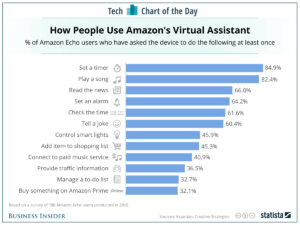Alexa: Your new roommate

Until three years ago, only a lucky few had had the pleasure of controlling their homes (… and spaceships …) with their voice: Tony Stark and the crews aboard in Star Trek. Today, 16% of American households (or around 39 million people) have their own personal voice assistant in the form of a smart speaker [1].
Since Amazon launched the Echo smart speaker to the public in July 2015, the Echo family smart speakers have reached an installed base of ~31 million units – comfortably demanding a ~70% market share (with the rest largely going to Google Home) [2].
For consumers, voice assistants embedded in smart speakers create value by providing a more convenient and human-like interaction with technology that save us time. We can in a few seconds say “Alexa, play the new Justin Timberlake song”, instead of having to find our phone, then open a browser to search for the title of the song, close the browser, open our music app of choice, connect to a speaker through wifi, and finally pres play. We can ask “Alexa, when is my wash done?” instead of going downstairs to find out.
Looking back, it’s not obvious that Amazon – an eCommerce retailer (admittedly with strong tech capabilities) – would define the name most frequently associated with voice assistants, “Alexa”. Apple had already integrated Siri with the iPhone 4S in October 2011 [3] and Google had developed Google Now (a version of today’s Google Assistant) in July 2012 [4]. So how did Alexa become so successful? And can it maintain its lead as a voice control platform?
Why Alexa is winning
- The first smart speaker: While Google and Apple had the first voice assistants, Amazon launched the first physical voice assistant device for our homes, the Echo, in July 2015. This removed a layer of friction – we no longer had to first locate our phones and open the voice assistant app. Google and Apple have been slow to follow suit. Google launched its $149 Google Home device in November 2016 [5] and Apple is launching it’s $349 HomePod start of 2018 [6].
- Cheap Echo devices allow trial: The Echo Dot retails at $49.99 (release March 2016, often discounted). Today, functionality is still limited (most common uses are to set a timer, play a song, or read the news [7]), but a cheap price allows consumers to try it out anyway.
- Open platform, many third-party relationships: Amazon decided early on (July 2015 [8]) to open its API and let outside developers contribute to Alexa’s functionality by setting up the Alexa Skills Store (Google did not allow external developers to contribute with “actions” until December 2016 [9]). This allowed the many SmartHome devices to better integrate with Alexa, so that users could control their thermostats, lighting, and locks all through Alexa without having to open separate apps. Today, Google still lacks behind – for example, Google Home lacks basic functionality like changing Philips Hue lights to preprogrammed settings like “relaxed light” or “study”.
How Amazon will capture value
- Voice shopping: Analysts estimate that 32% of Echo owners use Alexa to buy through Amazon Prime [7]. According to research firm CIRP, Echo owners spend $1,700 on Amazon vs. $1,300 for ordinary Prime members. [10]. That’s a juicy ~30% increase in sales.
- Feed personalization engine: eCommerce shelf space is restricted to the number of products that can fit on our screens. Knowing more about our habits will help Amazon target what gets recommended to us on Amazon.com.
- Amazon app store: Amazon allows third-party companies to program skills for Alexa-enabled devices and will in 2018 allow developers to charge subscription fees [11]. Amazon can capture value by demanding a part of the fees generated through the Alexa platform.
- AWS: Whenever a developer programs a skill for Alexa, it runs data storage, computing, and analytics on AWS, which Amazon can charge for.
Most common Alexa uses.
Source: [7]
Challenges ahead
- Google has deep search knowledge: Amazon has to develop strong (a partner to obtain) search capabilities. On a voice platform, it is crucial the requests are easily understood and answers are delivered correctly and concisely [12].
- Penetrating our phones and computers: Apple and Google have a strong advantage that they control their OS/Android ecosystems, which allow for smooth integration with other functionalities, such as sending mails and making calls. A risk for Alexa is that Apple/Google block Amazon out of their ecosystems. Google has already withdrawn YouTube support for the Echo Show [13].
- Security concerns: SmartHome devices with microphones and cameras in our homes provide an unpleasant breach of privacy if hacked. Some (smaller) efforts have already occurred. Santori, a malware, recently hijacked ~40,000 computers and SmartHome devices [14]. Ensuring security is paramount to make consumers feel comfortable with electronic ears and eyes in our homes.
————————————————————————————
Sources:
[1] https://techcrunch.com/2018/01/12/39-million-americans-now-own-a-smart-speaker-report-claims/
[2] https://www.voicebot.ai/2018/01/26/cirp-says-18-million-smart-speakers-sold-q4-2018-bringing-installed-base-45-million/
[3] https://www.cultofmac.com/447783/today-in-apple-history-siri-makes-its-public-debut-on-iphone-4s/
[4] https://www.cnet.com/news/google-io-day-one-google-continues-attacks-on-apple-amazon/
[5] https://www.theguardian.com/technology/2016/oct/04/google-home-launch-amazon-echo-voice-recognition-uk-living-rooms
[6] https://www.macrumors.com/roundup/homepod/
[7] http://www.businessinsider.com/what-people-do-with-amazon-echo-chart-2017-2
[8] https://developer.amazon.com/blogs/post/Tx205N9U1UD338H/Introducing-the-Alexa-Skills-Kit-Enabling-Developers-to-Create-Entirely-New-Voic
[9] https://www.theverge.com/2016/10/4/13164882/google-assistant-actions-on-google-developer-sdk
[10] https://www.digitalcommerce360.com/2018/01/03/us-shoppers-echo-device-spend-significantly-more-amazon/
[11] https://developer.amazon.com/blogs/alexa/post/a51e1424-6fdf-42f4-8683-07dd134d00bb/amazon-announces-new-ways-to-earn-money-with-your-alexa-skills-developer-preview
[12] https://www.washingtonpost.com/news/the-switch/wp/2018/01/07/the-battle-of-the-voice-assistants-comes-to-ces/?utm_term=.cb4ff72a3814
[13] https://www.usatoday.com/story/tech/talkingtech/2017/09/27/whats-next-amazon-alexa-were-find-out/707487001/
[14] https://www.technologyreview.com/s/610056/a-fast-evolving-new-botnet-could-take-gadgets-in-your-home-to-the-dark-side/
Photo: https://www.stonetemple.com/google-home-vs-amazon-alexa-showdown-which-one-is-smarter/




Thanks for sharing N! I was shocked to see that 16% of American households have a personal voice assistant in their homes; I would have thought the number would have been much lower. This space is becoming increasingly interesting as the Apple HomePod recently watched. It will be a fun race to follow… is this a winner take all market? Can Amazon, Google, and Apple all share a slice of the pie?
Also, what about gramLabs? Will personal assistants no longer just be “personal voice assistant” and potentially become an actual visual representation of a human with a voice assistant backend?
Great point about security… is there a proper balance between privacy and security? How will tech companies work with governmental organizations as this technology continues to evolve?